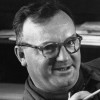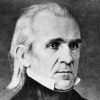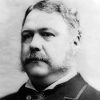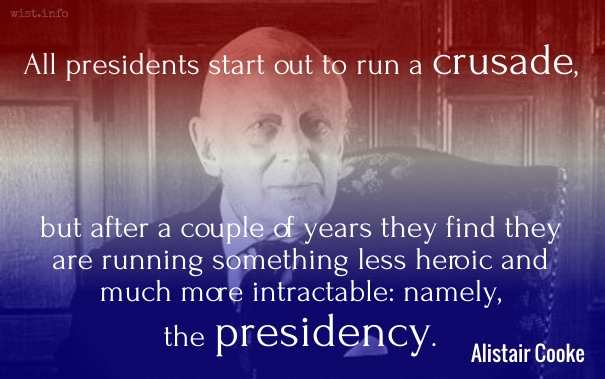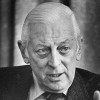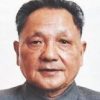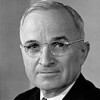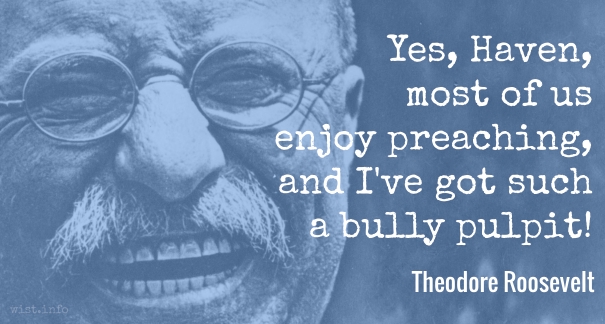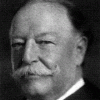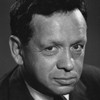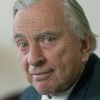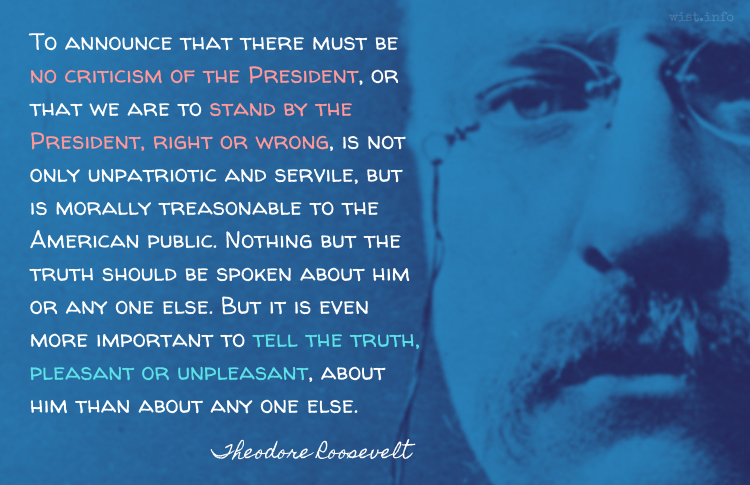This is the richest and most powerful country which ever occupied the globe. The might of past empires is little compared to ours. But I do not want to be the President who built empires, or sought grandeur, or extended dominion.
I want to be the President who educated young children to the wonders of their world.
I want to be the President who helped to feed the hungry and to prepare them to be taxpayers instead of tax-eaters.
I want to be the President who helped the poor to find their own way and who protected the right of every citizen to vote in every election.
I want to be the President who helped to end hatred among his fellow men and who promoted love among the people of all races and all regions and all parties.
I want to be the President who helped to end war among the brothers of this earth.Lyndon B. Johnson (1908-1973) American politician, educator, US President (1963-69)
“The American Promise,” speech to a Joint Session of Congress [43:30] (1965-03-15)
(Source)
Quotations about:
president
Note not all quotations have been tagged, so Search may find additional quotes on this topic.
These executives, who have risen to the top, have come to be responsible trustees, impartial umpires, and expert brokers for a plurality of economic interests, including those of all the millions of small property holders who hold stock in the great American enterprises, but also the wage workers and the consumers who benefit from the great flow of goods and services. These executives, it is held, are responsible for the refrigerator in the kitchen and the automobile in the garage — as well as all the planes and bombs that now guard Americans from instant peril. […] Full of the know-how that made America great; efficient, straightforward, honest, the chief executives, it is often said, ought really to be allowed to run the government, for if only such men were in charge there would be no waste, no corruption, no infiltration.
C. Wright Mills (1916-1962) American sociologist, academic, author [Charles Wright Mills]
The Power Elite, ch. 6 (1956)
(Source)
As President of our country and Commander-in-Chief of our military, I accept that people are going to call me awful things every day, and I will always defend their right to do so.
Barack Obama (b. 1961) American politician, US President (2009-2017)
Speech, United Nations (25 Sep 2012)
(Source)
I am heartily rejoiced that my term is so near its close. I will soon cease to be a servant and will become a sovereign.
James K. Polk (1795-1849) American lawyer, politician, US President (1845-1849)
Diary (1849-02-13)
(Source)
I attended to some of the business on my table to-day. Many matters of minor importance and of detail remain on my table to be attended to. The public have no idea of the constant accumulation of business requiring the President’s attention. No President who performs his duties faithfully and conscientiously can have any leisure. If he entrusts the details and smaller matters to subordinates constant errors will occur. I prefer to supervise the whole operations of the government myself rather than entrust the public business to subordinates, and this makes my duties very great.
James K. Polk (1795-1849) American lawyer, politician, US President (1845-1849)
Diary (1848-12-29)
(Source)
If the more aged and experienced men who have filled the office of President of the United States even in the infancy of the Republic distrusted their ability to discharge the duties of that exalted station, what ought not to be the apprehensions of one so much younger and less endowed now that our domain extends from ocean to ocean, that our people have so greatly increased in numbers, and at a time when so great diversity of opinion prevails in regard to the principles and policy which should characterize the administration of our Government? Well may the boldest fear and the wisest tremble when incurring responsibilities on which may depend our country’s peace and prosperity, and in some degree the hopes and happiness of the whole human family.
James K. Polk (1795-1849) American lawyer, politician, US President (1845-1849)
Inaugural Address (4 Mar 1845)
(Source)
Although in our country the Chief Magistrate must almost of necessity be chosen by a party and stand pledged to its principles and measures, yet in his official action he should not be the President of a part only, but of the whole people of the United States. While he executes the laws with an impartial hand, shrinks from no proper responsibility, and faithfully carries out in the executive department of the Government the principles and policy of those who have chosen him, he should not be unmindful that our fellow-citizens who have differed with him in opinion are entitled to the full and free exercise of their opinions and judgments, and that the rights of all are entitled to respect and regard.
James K. Polk (1795-1849) American lawyer, politician, US President (1845-1849)
Inaugural Address (4 Mar 1845)
(Source)
I told him that, thank God, under our constitution there was no connection between Church and State, and that in my action as President of the U.S. I recognized no distinction of creeds in my appointments to office.
James K. Polk (1795-1849) American lawyer, politician, US President (1845-1849)
Diary (1846-10-14 )
(Source)
For a man of sensitivity and compassion to exercise great powers in a time of crisis is a grim and agonizing thing.
Richard Hofstadter (1916-1970) American historian and intellectual
The American Political Tradition: And the Men Who Made It, Part 5, ch. 7 (1958)
(Source)
Referring to Abraham Lincoln and the Civil War.
Madam, I may be President of the United States, but my private life is nobody’s damn business.
Chester Alan Arthur (1829-1886) American attorney, politician, US President (1881-85)
(Attributed)
In various sources, this was a reply made to a temperance reformer about his drinking alcohol, against journalists writing of his late wife and children, or to a gossip commenting on rumors he was seeing other women.
Our loyalty is due entirely to the United States. It is due to the President only and exactly to the degree in which he efficiently serves the United States. It is our duty to support him when he serves the United States well. It is our duty to oppose him when he serves it badly. This is true about Mr. Wilson now and it has been true about all our Presidents in the past. It is our duty at all times to tell the truth about the President and about every one else, save in the cases where to tell the truth at the moment would benefit the public enemy.
In our brief national history, we have shot four of our presidents, worried five of them to death, impeached one and hounded another out of office. And when all else fails, we hold an election and assassinate their characters.
The United States brags about its political system, but the President says one thing during the election, something else when he takes office, something else at midterm and something else when he leaves.
Deng Xiaoping (1904-1997) Chinese revolutionary, politician, statesman [Teng Hsiao-p'ing]
Comment (1983)
(Source)
When asked by a group of American professors about China's political stability. Quoted in Philip West and Frans A. M. Alting von Geusau, The Pacific Rim and the Western World: Strategic, Economic, and Cultural Perspectives (1987).
My view was that every executive officer, and above all every executive officer in high position, was a steward of the people bound actively and affirmatively to do all he could for the people, and not to content himself with the negative merit of keeping his talents undamaged in a napkin. I declined to adopt the view that what was imperatively necessary for the Nation could not be done by the President unless he could find some specific authorization to do it. My belief was that it was not only his right but his duty to do anything that the needs of the Nation demanded unless such action was forbidden by the Constitution or by the laws. Under this interpretation of executive power I did and caused to be done many things not previously done by the President and the heads of the departments. I did not usurp power, but I did greatly broaden the use of executive power. In other words, I acted for the public welfare, I acted for the common well-being of all our people, whenever and in whatever manner was necessary, unless prevented by direct constitutional or legislative prohibition.
When you get to be President, there are all those things, the honors, the twenty-one gun salutes, all those things. You have to remember it isn’t for you. It’s for the Presidency.
Yes, Haven, most of us enjoy preaching, and I’ve got such a bully pulpit!
Theodore Roosevelt (1858-1919) American politician, statesman, conservationist, writer, US President (1901-1909)
(Attributed)
In George Haven Putnam, The Works of Theodore Roosevelt, Vol. 9, Introduction (1926). Roosevelt's reply when, during his first presidential term, Putnam accused him of tending to preach to people.
PRESIDENT, n. The leading figure in a small group of men of whom — and of whom only — it is positively known that immense numbers of their countrymen did not want any of them for President.
Ambrose Bierce (1842-1914?) American writer and journalist
“President,” The Devil’s Dictionary (1911)
(Source)
Originally published in the "Cynic's Word Book" column in the New York American (1906-06-14).
The intoxication of power rapidly sobers off in the knowledge of its restrictions and under the prompt reminder of an ever-present and not always considerate press, as well as the kindly suggestions that not infrequently come from Congress.
Oh, if there is a man out of hell that suffers more than I do, I pity him.
That is the kind of America in which I believe. And it represents the kind of Presidency in which I believe — a great office that must neither be humbled by making it the instrument of any one religious group nor tarnished by arbitrarily withholding its occupancy from the members of any one religious group. I believe in a President whose religious views are his own private affair, neither imposed by him upon the nation or imposed by the nation upon him as a condition to holding that office.
John F. Kennedy (1917-1963) US President (1961-63)
Speech, Greater Houston Ministerial Association (12 Sep 1960)
(Source)
There is but one way for a president to deal with Congress, and that is continuously, incessantly, and without interruption. If it is really going to work, the relationship has got to be almost incestuous. He’s got to know them better than they know themselves. And then, on the basis of this knowledge, he’s got to build a system that stretches from the cradle to the grave, from the moment a bill is introduced to the moment it is officially enrolled as the law of the land.
Lyndon B. Johnson (1908-1973) American politician, educator, US President (1963-69)
Comment to Doris Kearns Goodwin
(Source)
Quoted in Doris Kearns Goodwin, Lyndon Johnson and the American Dream, ch. 8 "The Great Society" (1976). Kearns was an intern and staff member in the Johnson White House, and worked with him on his memoirs.
The presidency has made every man who occupied it, no matter how small, bigger than he was; and no matter how big, not big enough for its demands.
Lyndon B. Johnson (1908-1973) American politician, educator, US President (1963-69)
Proclamation 3489, “Commemoration of the Beginnings of the Office of the Presidency of the United States” (1964-04-30)
(Source)
On the 175th anniversary of George Washington taking the first oath of office as President.
Presidents quickly realize that while a single act might destroy the world they live in, no one single decision can make life suddenly better or can turn history around for the good.
Lyndon B. Johnson (1908-1973) American politician, educator, US President (1963-69)
Speech, Signing a Bill Extending the Peace Corps Act, Georgetown University (1966-09-13)
(Source)
Broader context:
To hunger for use, and to go unused, is the worst hunger of all. [...] It is true that few men have the power by a single act of theirs or in a single lifetime to shape history for themselves. Presidents, for example, quickly realize that while a single act might destroy the world they live in, no one single decision can make life suddenly better or can turn history around all for the good. But Presidents do know that a nation is the sum total of what we all do together; that the deeds and desires of each citizen fashion our character and shape our world -- just as one tiny drop of water after another will ultimately make a mighty river.
One lesson you better learn if you want to be in politics is that you never go out on a golf course and beat the President.
Lyndon B. Johnson (1908-1973) American politician, educator, US President (1963-69)
Remark to Larry O’Brien III (1964)
(Source)
On the occasion of O'Brien beating Johnson by one stroke on a nine-hole golf outing. Noted by his father in his book, No Final Victories: A Life in Politics, ch. 8 "LBJ" (1974).
See Gracian.
Every President wants to do right.
Lyndon B. Johnson (1908-1973) American politician, educator, US President (1963-69)
Quoted in George Christian, The President Steps Down, ch. 1, sec. 3 (1970).
(Source)
Christian, who was Johnson's press secretary, says this was a frequent comment by Johnson, who would then go on to defend previous Administrations, Democratic and Republican, from the worst accusations of their then-detractors.
The second office of the government is honorable & easy, the first is but a splendid misery.
Thomas Jefferson (1743-1826) American political philosopher, polymath, statesman, US President (1801-09)
Letter to Elbridge Gerry (13 May 1797)
(Source)
On the vice-presidency and presidency of the United States. Written after he had lost to John Adams, who became President and him Vice-President.
When I ran for Presidency of the United States, I knew that this country faced serious challenges, but I could not realize — nor could any man realize who does not bear the burdens of this office — how heavy and constant would be those burdens.
John F. Kennedy (1917-1963) US President (1961-63)
“Radio and TV Report to the American People on the Berlin Crisis” (25 Jul 1961)
(Source)
The legislative job of the President is especially important to the people who have no special representatives to plead their cause before Congress — and that includes the great majority. The President is the only lobbyist that 150 million Americans have. The other 20 million are able to employ people to represent them — and that’s all right, it’s the exercise of the right of petition — but someone has to look after the interests of the 150 million that are left.
I believe that the public temper is such that the voters of the land are prepared to support the party which gives the best promise of administering the government in the honest, simple, and plain manner which is consistent with its character and purposes. They have learned that mystery and concealment in the management of their affairs cover tricks and betrayal. The statesmanship they require consists in honesty and frugality, a prompt response to the needs of the people as they arise, and a vigilant protection of all their varied interests.
Grover Cleveland (1837–1908) American President (1885–1889, 1893–1897)
Letter accepting Democratic nomination for President (8 Aug 1884)
(Source)
The President must be greater than anyone else, but not better than anyone else. We subject him and his family to close and constant scrutiny and denounce them for things that we ourselves do every day. A Presidential slip of the tongue, a slight error in judgment — social, political, or ethical — can raise a storm of protest. We give the President more work than a man can do, more responsibility than a man should take, more pressure than a man can bear. We abuse him often and rarely praise him. We wear him out, use him up, eat him up. And with all this, Americans have a love for the President that goes beyond loyalty or party nationality; he is ours, and we exercise the right to destroy him.
Whatever issue may come before me as President — on birth control, divorce, censorship, gambling or any other subject — I will make my decision in accordance with these views, in accordance with what my conscience tells me to be the national interest, and without regard to outside religious pressures or dictates. And no power or threat of punishment could cause me to decide otherwise. But if the time should ever come — and I do not concede any conflict to be even remotely possible — when my office would require me to either violate my conscience or violate the national interest, then I would resign the office; and I hope any conscientious public servant would do the same.
John F. Kennedy (1917-1963) US President (1961-63)
Speech, Greater Houston Ministerial Association (12 Sep 1960)
(Source)
The President is merely the most important among a large number of public servants. He should be supported or opposed exactly to the degree which is warranted by his good conduct or bad conduct, his efficiency or inefficiency in rendering loyal, able, and disinterested service to the nation as a whole. Therefore it is absolutely necessary that there should be full liberty to tell the truth about his acts, and this means that it is exactly as necessary to blame him when he does wrong as to praise him when he does right. Any other attitude in an American citizen is both base and servile. To announce that there must be no criticism of the President, or that we are to stand by the President, right or wrong, is not only unpatriotic and servile, but is morally treasonable to the American public. Nothing but the truth should be spoken about him or any one else. But it is even more important to tell the truth, pleasant or unpleasant, about him than about any one else.
Theodore Roosevelt (1858-1919) American politician, statesman, conservationist, writer, US President (1901-1909)
“Sedition, A Free Press, and Personal Rule,” Kansas City Star (7 May 1918)
(Source)
Reprinted in "Lincoln and Free Speech," The Great Adventure (1926).


